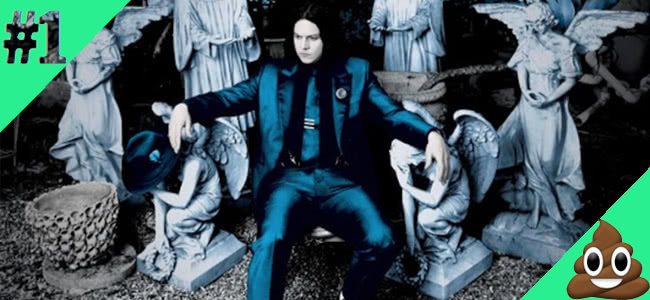If there’s one thing we’ve learnt about Jack White in the last week, if not in the last 17 years, it’s that he doesn’t play by anyone else’s rules. Whilst most artists seem to follow a series of logical steps when hyping up their forthcoming album, this red, white, and black rocker-turned-blue-tinged star’s approach to promoting his second solo album is… a little bit left of centre.
Along with gifting fans with a few new tracks, White has also broken a world record by making the world’s fastest record (how meta is that?), declared his disdain for The Black Keys and others and then just days later, taken it all back and asked everyone to forgive his arrogant statements. Tumultuous? Yes. Necessary? Probably not.
So given that all the hullabaloo is over (for now), the question on everybody’s lips is: does Lazaretto stand up against White’s glorified discography and outshine his engulfing ego or has the White Wizard become what he so lividly despises – a watered-down version of himself? Let’s find out.
Hit
One thing that Jack White has always been even better at than mouthing off about other musicians is creating out-of-this-world guitar licks that rupture the ears and invigorate the soul. Fortunately, Lazaretto contains plenty of these kinds of moments. Opening number ‘Three Women’ spews out a rollicking riff that feels like it was taken right out of the 1960s, ‘High Ball Stepper’ fiercely stomps around like an ‘Elephant’ (zing) and the title track crunches, splutters, and splats like nobody’s business resulting in a weird funk, hip-hop, and rock hybrid.
In an age where DJs are kings and guitar gods are fabled figures from the salad days of Baby Boomers, it’s comforting to know that at least one person still knows how to wield this six-stringed axe.
Shit
White has always been a master of minor reinvention, both within and across his myriad of projects. Yet, some of this record feels like it was cut from the exact same cloth as its predecessor, Blunderbuss. Whilst it’s unfair to criticise him for writing a second album about heartbreak and deception, considering A) he has recently gone through a divorce and B) Taylor Swift has done this four times over and no one has even batted an eyelash, it’s hard to deny that there are moments where this fusion of blues rock, country, and soul sounds eerily similar to songs heard on Blunderbuss.
Take ‘Alone In My Home’ and ‘I Think I Found The Culprit’ as examples; the former feels like a perkier take on ‘Hip (Eponymous) Poor Boy’ whilst the latter sounds like a fiery union of ‘Love Interruption’ and ‘Hypocritical Kiss’. That’s not to say that these tracks are derivative of the forefathers, it just simply feels like White hasn’t improved on the foundation he laid down two years ago.
[include_post id=”394643″]
Hit
In spite of its aforementioned unoriginality (by White’s standards), the diversity of genres on this album still stands as one of the finest elements of the 38-year-old’s solo work. Jumping between a shameless showing of country folk, stifling blues-rock, and ‘60s soul, Lazaretto runs the risk of being too ambitious in its diversity. Yet similar to Blunderbuss, each number is reinforced by a consistent soundscapes brimming with fiddles, amiable guitar rhythms and electrifying solos, along with a ubiquitous sense of tension that only White’s visceral cries could so effectively summon.
With this formula – that coalesces its diversity with an underlying consistency – White proves that he can still be pretty darn good even when he’s not doing anything that remarkable.
Hit
Leading on from this, this record is also what us music journos like to describe as a ‘grower’. On the first few listens, no element of this record (apart from White’s aforementioned guitar work) really sticks out. There are no infectious hooks, no moving ballads to tear up to and no monster-rock tracks to fuel your teenage rebellion. Yet over time, each track slowly reveals itself, exposing muscular melodies and arrangements that possess a classic quality that will serve this record well in the future. White proves that he can still be pretty darn good even when he’s not doing anything that remarkable.
Shit
Depending on your perspective however, the slow burning nature of this record could also be considered one of its most immediate weaknesses as it denies itself the opportunity to utilise one of White’s signature moves – an instantly loveable, ball-blistering rock song.
In the span of 40 minutes, at no point do any of the 11 tracks confront like ‘Icky Thump’, invigorate like ‘Sixteen Saltines’ or feel as crucial as ‘Seven Nation Army’. Ultimately, what Lazaretto lacks is not a phenomenal rock song, but the fierce sense of audacity and urgency that White has impressed into these past anthems.
Hit
Towards the end of this record however, White does comes pretty close to regaining his title as a rock n’ roll demigod on ‘That Black Bat Licorice’.
Fuelled by a freaky-funk guitar riff, ‘That Black Bat Licorice’ is eruptive, anxious, amusing and more insane than Charlie Sheen circa 2011. From dropping references to Nietzsche and Freud to rhyming ‘Dumbo’ with ‘Columbo’, this track is an all-out word attack that sees White’s wit in its finest form. The greatest moment however is when he yelps, “I never liked it! I never will! Now say the same damn thing with the violin!” before the declared instrument slides into a frantic solo that only White could pull off with such panache.
[include_post id=”402737″]
Final Verdict: Hit
Lazaretto may not stun or stimulate quite in the way that Jack White has achieved in the past but asides from this, the contemporary blues legend has created yet another record that exudes passion, proficiency and peculiarities at every turn. If sparking needless controversy is what Jack White requires to make music of this standard, then let him eat his cake.




































